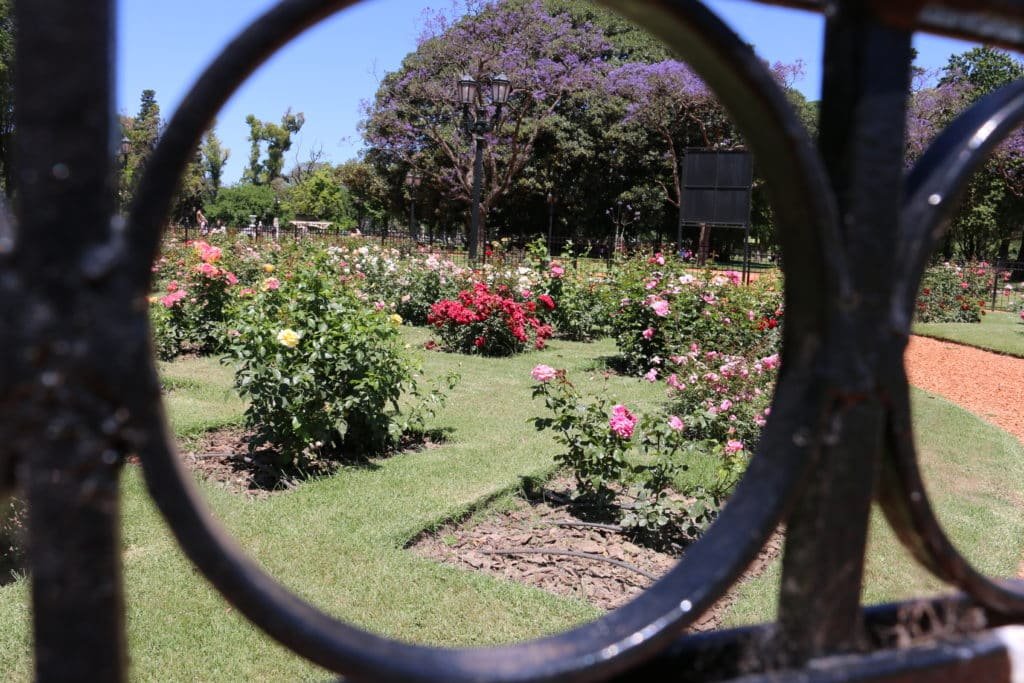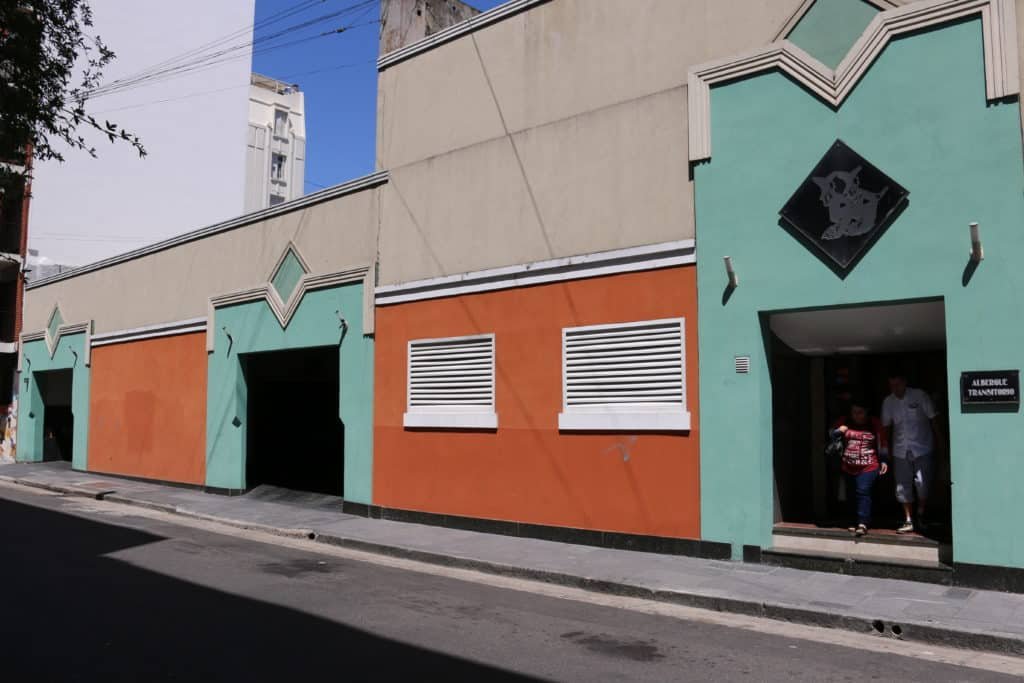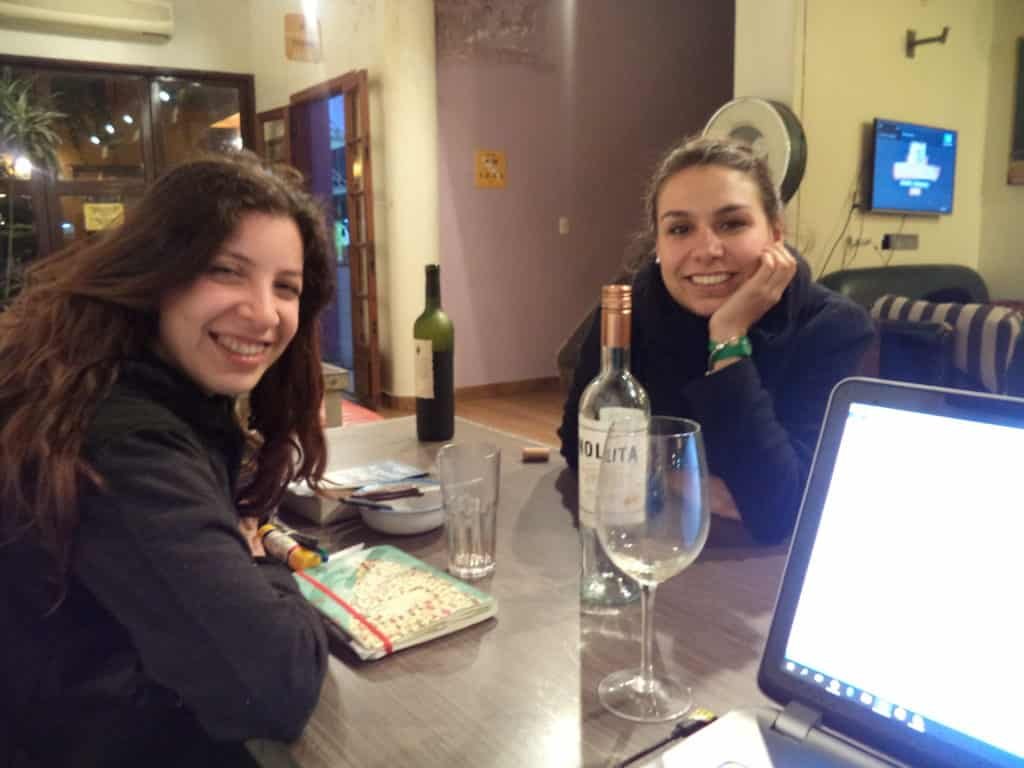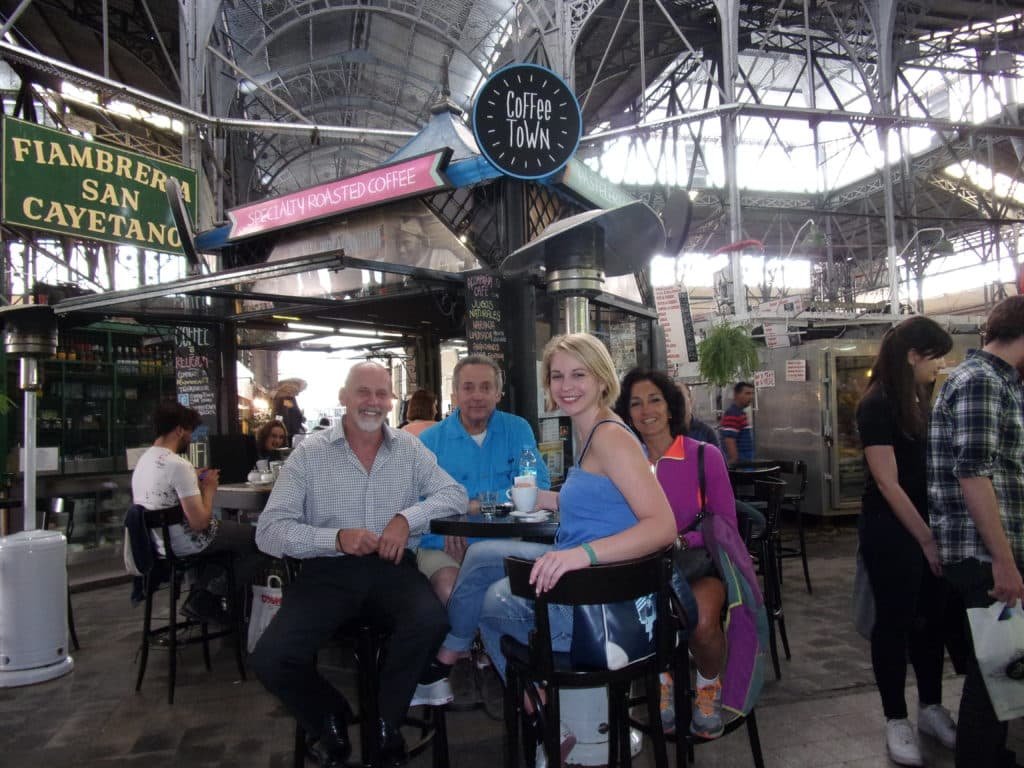by John Bechtel | Jul 23, 2017 | Argentina, Buenos Aires, South America

This is my friend Matthew. His family is from El Salvador. He is going to be a fine young man, as you can see from this picture. He is already preparing for one of his first rites of passage, with the help of his Dad. Matthew and his wonderful family now live in Florida.

These are Matthews two sisters, from left to right, Elizabeth and Tiffany. These are some of my best reasons for traveling. Sometimes they bring their culture and kindness to you, and sometimes they just show up in your life, and enrich it more than they could know. But once you meet them they change your life forever.
Greetings again from Buenos Aires. I arrived on July 10, and of course I have a plan. It’s a bit ambitious, maybe even a little over the top. Argentina is a very large country, the eighth largest in the world for area. It is about 2/3 the size of the continental U.S., and it has virtually every type of topography and climate imaginable, from glaciers to deserts to jungle to very high mountains (including the 2nd highest in the world after Mt. Everest as measured by the topographic prominence method of height) to vast savanna. I have divided the country into eight regions, and I intend to spend about three months in each of those regions exploring, interviewing, photographing, and writing for publication. I will use the internet and referrals to find lodging with families in their homes. How better to learn the history and culture of a country than to hear it from those who have spent their lives there? I will leave Argentina periodically for travel assignments to other parts of the world, but will return to Argentina as my base of operations. At the end of the project I will write and seek a publisher for a comprehensive English-language cultural history of Argentina, as told to me by Argentines.
(more…)
by John Bechtel | Jun 11, 2017 | Argentina, Buenos Aires, San Telmo

This writer, recording observations from travelers from 42 countries that he met over six months in Puerto Limon Hostel, barrio of San Telmo, Buenos Aires, Argentina. He returns there in three weeks to continue his exploration of Buenos Aires and the eight regions of Argentina. He writes about people and places all over the world. See samples of his writing here on this website, www.johnbechtelwriter.com/articles and subscribe to this blog by entering your email in the blank space for it at the top right of this page.
I spent six months, from August 2016 through January 2017 sleeping in the same bunk bed in a hostel called Puerto Limon in Buenos Aires, Argentina. Many have asked why I went, what I learned, and what it has been like to return to the U.S. My experience was not that of a typical tourist or backpacker. I went to Argentina with purpose; I wanted an immersion experience with tourists from all over the world and I wanted to write about what I learned. I traveled to learn about travelers. I went with my backpack and my camera case. Nothing else. No suitcases. I interviewed, wrote, and was published. You can read some of it on this blog and some published articles on this website at www.johnbechtelwriter.com/articles/. I have material for many other articles which I have no doubt will be published in due time. I met travelers from 42 countries and collected over 150 of their email addresses. Some of us have become good friends. As I contact many more of them who think I forgot them, I am sure more friendships will blossom. In no particular order, and in compressed form, here are some observations and comparisons from my trip. Others may not agree.
There seems to be a vegetable and fruit stand on every corner in Buenos Aires. Most of the proprietors are men and women from Bolivia.

Fruit and vegetables are usually sold by weight. The proprietors are serious business people who concern themselves with merchandising, display, inventory control and waste. They are always present. There are no cash registers which means they are masters of basic math. I wonder how many of our North American fast food cashiers could do as well?
Peanut butter is hard to find. Really good feta cheese is almost impossible to find. Handkerchiefs were scarce, and Argentine T-shirts didn’t last through very many washings. The proprietor of the local butcher shop could do amazing things with his meat cleaver and a raw chicken. Once he cut his hand while preparing my order. You can walk around the same block twenty times and see an establishment that you missed all the other times. When they close up, they all look the same. Most of the locals I met did not speak any English, or just a word or two. About like my Spanish. Bothering to learn their first name and remembering it always lit up their faces with a smile.
Never order “American food” in Buenos Aires. Things like pizza, hamburgers, and certainly not a Long Island Iced Tea. You may not recognize what comes to your table. They have their own fast food, which, if you give it a chance, is just as good but different. Like choripán, which means a sausage sandwich.

Choripán on the grill (parilla). Argentina’s favorite fast food.
It originated in Argentina but has spread to contiguous countries like Chile and Brazil. The secret ingredient is chimichurri. Use the usual condiments with caution; they often have an extremely high salt content. I have wondered what a choripán would taste like with a good horseradish-based mustard.
(more…)
by John Bechtel | May 21, 2017 | Buenos Aires

The Palacio Barolo, Av. de Mayo 1370, Buenos Aires, once the tallest building in all of South America, is still one of the most fascinating, and is easily accessible by foot, bus, subway, or guided tours.
Luis Barolo, an Italian industrialist, was a Mason, and a great admirer of another Mason, the poet Alghieri Dante, who lived about six hundred years before him. Dante was a pioneer celebrity in the late medieval era, and his long narrative poem The Divine Comedy takes the reader on a detailed guided tour of Hell, Purgatory, and Heaven, and is still considered the preeminent Italian contribution to world literature. The poem is an allegory about getting close to God and has much to say about sin, redemption, ethics, and moral life. Dante was a member of a number of secret societies of his time, and it is not surprising that his poem is also full of numbers and symbolisms. Luis Barolo, who came to Argentina in 1890, wanted to design and construct an office building inspired by The Divine Comedy. Like most of the Italians living in Argentina after World War I, Barolo wondered if Italy was going to go out of existence. Therefore he intended for his Palacio Barolo to become Dante’s mausoleum where his ashes could be kept safe. Italy remained in existence, however, and Dante’s ashes remained in Ravenna.
Barolo hired another Italian Mason, Mario Palanti, to design the building. Barolo died before the building opened to the public, but his architect lived to be almost 100 and died in his home country in 1979. Palanti was a scholar of The Divine Comedy and filled the building with references to the poem. The building is exactly one hundred meters high, one meter for each of the 100 cantos in Dante’s poem. The building is divided into three parts, Hell, Purgatory, and Heaven, also symbolizing the Holy Trinity of God, Son, and Holy Ghost. There are 22 floors; there are 22 stanzas in some cantos. There are 11 balconies on the front of the building; there are 11 stanzas to some of the cantos. The Ground Floor and two basements represent Hell. The central hall of the palace has nine arches representing the nine hierarchies of Hell. On the columns of the transverse arches there are twelve lamps supported by four condors, four female dragons, and four male dragons. that represent the alchemy principles, mercury, sulphur, and their attributes.
Recessed into the Ground Floor, there are twelve round circles outlined in brass, and at one time, beneath these circles were bright lights. At night, when it was dark inside, and the recessed and hidden lights were turned on from the first basement below, beams of light shot upward through the circles and colored glass implanted in the floor and into the darkness of the grand hallway, signifying the fires of Hell.

There are twelve of these round circles in the Ground Floor. When the lights hidden beneath the colored glass were lit, beams of colored light would shine up through the darkness of the grand hallway, signifying the fires of Hell.
(more…)
by John Bechtel | Jan 13, 2017 | Argentina, Buenos Aires, Puerto Limon Hostel, San Telmo, South America

A rare photograph of Marina with her buddy Rick. We never figured out who was mentoring who. Marina, who is Russian, for some reason was photo- phobic and we always joked with her about being on the run from the KGB. Or working for them. (At Puerto Limon Hostel nothing is sacred and sooner or later everyone becomes the butt of some kind of good-natured joking.)
Marina is gone. She left us (again) about a month ago and disappeared into the mists and fog of rain-drenched Buenos Aires. She said she was going back to Germany, where she insisted she was not from. Marina Zubkova claimed she was Russian, but as far as I know, no one ever verified that by looking at her passport. We had a lot of people passing through Puerto Limon claiming to be one thing or another. Writers with no laptops, Swiss bankers trying to borrow other people’s cell phones to communicate with Panama; you never knew. But Marina probably was Russian. For one thing, she knew how to make borscht. And even though she spoke fluent German, she never wanted to be referred to as a German. So of course, we all borrowed a line out of Fawlty Towers: “Don’t mention the war!”
We loved Marina. We still do. We have dozens of photos of her holding her hands in front of her face when she thought we were taking her picture. Marina got teased a lot, but she always rose to the occasion, and we all got accustomed to her querulous voice rising to the pretend accusations, both parties betrayed by the shitty grins on their faces. Marina is very bright (English is her third or fourth language), and very diligent, responsible, and supremely organized. That’s why we wondered if she wasn’t secretly a German. Marina never shirked her duty. But the Russian in her could never admit things were good. Marina never had enough rest, and if you pointed out the good things that were happening, Marina’s rejoinder always began with “Yes, but . . . ” When Marina went out with a group, like any Marine, she always made sure everyone got home safe. She never left anyone behind.
Marina always gave back. She ate my bananas, but she taught me Excel. And if I asked her for help, she never turned me down. She would even apologize for making me wait sometimes until she could get to it. She taught me how to use my camera. If something didn’t work right, she couldn’t leave it alone until she figured it out. She never refused a beer.
(more…)
by John Bechtel | Jan 7, 2017 | Argentina, Buenos Aires, Economics, Extended travel

Incredibly, this is the Buenos Aires home of their water department. Built in 1894, it contains offices, some large water tanks, and a toilet museum. The country that commissioned this palace to house their water utility over a century ago today can’t deliver or track the delivery of even a hearing aid, the bureaucratic quagmire is so dense.
On a recent Friday, Puerto Limon Hostel where I reside in Buenos Aires got a phone call asking if I was a resident there. They asked for my passport number and said they had received a small package addressed to me from the U.S. The package contained a replacement hearing aid from the Audibel hearing aid organization in Florida. As part of my warranty on their product, they had agreed to replace the hearing aid I had lost, and put on the bill of lading a value of $2 because zero was not acceptable. The following Monday, a Fed Ex driver stopped by the Hostel, not to deliver the package, but to drop off two pages of confusing instructions, in Spanish, about how to pay customs charges of U.S. $121 and an additional AR $250 for my free package. I had heard horror stories about package delivery in Argentina, but being the eternal optimist, I was ready to find out for myself. I do not visit a country to become its critic, and after five months of residence here, I loved Buenos Aires and learned more every day. I even entertained notions of using this experience to deepen my understanding of how customs worked, and how the values were determined.
So I set about with one of the receptionists here, who tried to translate the written instructions. Eventually she gave up and called the local Fed Ex office. They explained what I would owe, which I thought was ridiculous. After all, a comparable hearing aid was simply not available in Argentina, and why would they punish a handicapped person (not being able to hear IS a handicap) by making a replacement as difficult and as expensive as possible? It’s not as if they could repair or replace it from an Argentine provider. The following is what happened next to me and Erika, my assistant and interpreter, who was helping me on her precious day off work:
(more…)
by John Bechtel | Dec 25, 2016 | Argentina, Buenos Aires, Entrepreneurship

Estefania Gulina, first time Executive Producer, from Cordoba, Argentina
Some live lives of unfulfilled promise; lives that could have been, but that didn’t happen. Sometimes because the individuals are too dull-witted to even conceive of their own possibilities, overwhelmed and paralyzed by too many possibilities, too risk averse to take a chance, or lacking the industry and persistence to pursue their dreams with focus and stamina. None of this describes Estefania Gulina, a 32-year-old first-time Executive Producer of a movie to be filmed in Cordoba, Argentina, and a recent guest at Puerto Limon Hostel here in Buenos Aires. Her motto is “The way traveled was not wasted time if it has really been lived.”
Estefania is passionate about everything she does; she has little tolerance for a monochromatic existence, and if she is going to do something, she will hold back nothing as if subconsciously preparing for failure. She says her broad interests and passion for making things happen are the reason she has gotten involved and stayed with projects for years. But she is no fool either.
(more…)
by John Bechtel | Dec 20, 2016 | Argentina, Buenos Aires, Puerto Limon Hostel, South America

From the left: John Bechtel, freelance travel and culture writer; Joshua Kelsey, scholar, linguist, backpacker; William Morgan, medical science researcher. They are waiting for Rick Powell, the chef of Puerto Limón Hostel, to make his appearance after preparing Lenguado Ceviche.
Puerto Limón Hostel, Buenos Aires
I have often been asked why I continue to live in Puerto Limón Hostel here in the San Telmo barrio of Buenos Aires. There are many travelers here who have far more experience than I do with hostel life in many countries. There are 50 beds in this hostel, and other than Rick Powell, an American from Indiana who has been here for eight years, I now have the most seniority. I have become a long-term guest and I have remained here because it serves my purposes for coming to Argentina in the first place.
In the last five months I have met people from 39 countries from right here in the Community Room of Puerto Limón Hostel. This hostel has a cozy feeling to it, a touch of Tuscany, let’s say. It’s air conditioned, very clean, and well organized. But I could get all of that and more in a hotel, albeit at a higher price. What I could not get in an apartment, a home, or even a popular bar, is the opportunity to meet and engage with all these people. I find this very soul-satisfying. Relatively speaking, there are few Americans who come through here. But just last week I met the exception, the very exceptional William Morgan, a retired medical science researcher at the university level, whose specialty was malaria.
(more…)
by John Bechtel | Nov 24, 2016 | Buenos Aires, Freelance Writer, Puerto Limon Hostel, South America

The traveler
For this particular Thanksgiving Day, we will leave the worries of the world at the door and travel themeless, timeless, but not thoughtless. Here are thoughts, sights, sounds, smells, and springtime pleasures from travelers at the Puerto Limon Hostel in Buenos Aires.
The Traveler: The traveler has no safety net. At home the familiar and unchanging serve as a safety net. But the traveler needs to be in the zone, and in the flow. Otherwise he can get lost with no one to help him. He can’t bother with worry or fear. So he allows for everything and can know nothing for sure, trusting that in the end things will be as they need to be.

This is a recently published article I wrote about how the Finns stole the tango from Argentina and rebranded it to their own culture. Click on the picture to read the entire article.

Rose garden and jacaranda trees in November
In the springtime, the mind turns to love, and in Buenos Aires business picks up for the transitorios. Lunfardo, or Buenos Aires slang popular in the neighborhoods where the tango also began, had a special word for where lovers met. One characteristic of lunfardo is that it reverses the order of syllables, so that hotel becomes tel-ho. But in Spanish, the “h” is silent, so telho is pronounced as telo. On the street a telo is lunfardo slang for a transitorio, one of which is directly across the street from Puerto Limon Hostel where I have stayed for the last four months.
So what is a transitorio? It is a place where you can rent rooms by the hour in order to have sex—but it is not a whorehouse. Far from it.

A Buenos Aires “telo” or transitorio, where you can have privacy, discretion, and imagination for a reasonable price.
The lodging is provided, but not the partner.
(more…)
by John Bechtel | Nov 4, 2016 | Argentina, Buenos Aires, Puerto Limon Hostel, San Telmo

Enya (composer and lead band vocalist from Chile) and Ana (agricultural commodities specialist from Mexico) making their futures happen.
The Petri dish at Puerto Limon Hostel
This hostel of Puerto Limon is a Petri dish in which generations of humanity pass in compressed form; it is a reduction sauce that intensifies the scents and flavors of global cultures, colliding, embracing, arguing, dealing with lost loves and chasing new sensations–all in a mad, chaotic rush to imaginary finish lines: the end of a vacation, a flight from frustrations, boredom, or responsibility, or an endlessly delayed dodge of the need to return to productive life, or possibly to engage with it for the first time. The hostel is a place where you can hide from your enemies, your friends, from life, or from yourself (in the latter case, particularly is this so if you don’t like yourself, or are afraid to find out more.) The hostel is a place where you can stumble across answers to questions you were afraid to ask. Some recent specimens observed in this amazing laboratory have been:
The Vacationers
The majority of guests here are vacationers, usually from other parts of South America. These usually come in groups, sometimes just couples, and there is a lot of laughter and happy talking. They experience mild sorrow that their stay is ending, but they have roots to go back to, homes, traditions, extended families, and familiar cultures. They put in big days of sightseeing here, and go out some nights, because Buenos Aires is a city of the night. But the vacationers tend to come back a little earlier, perhaps between midnight and 2 a.m. The next day it begins all over again, and time is not to be wasted.
The Refugees
Then there are the refugees, usually from Venezuela, a country that is such a mess it makes Cuba look forward-thinking. When a guest at Puerto Limon says they are from Venezuela, you don’t have to ask if they are on vacation, or when they are planning on going “home”. They aren’t. Many of them are professionals, well educated, ambitious, and speak much better English than most Argentinians. Maybe that is because the upper middle class of Venezuala (from a time when there was a middle class at all) are the only few with enough resources left to flee the country and make their way south. The others are literally starving and millions protest in their streets. Complete lawlessness and anarchy cannot be far behind.
(more…)
by John Bechtel | Sep 22, 2016 | Freelance Writer

From left, Jose Hernandez (Argentinian pharmaceutical executive working in Baltimore); John Bechtel (author); Santana Subenbach (German backpacker in Buenos Aires), Hannah Ilva (Argentinian medical worker living in Boston) all of whom met by accident at the San Telmo Mercado on their way to other places.
There is an old Jewish joke about a Mrs. Berkowitz having a conversation with a friend. During the conversation the friend remarked at the beauty and breathtaking size of the diamond ring on Mrs. Berkowitz’s left hand. Mrs. Berkowitz phlegmatically responded that yes, it was the famous Berkowitz diamond but added after a brief pause, “but it comes with the infamous Berkowitz curse.” “And what is that?” her friend inquired. “Mr. Berkowitz” came the immediate reply.
It seems everyone wants to be a writer, and why not? It comes with a certain romantic cachet. You instantly become labeled as a wordsmith, a creative spirit, an intellectual, and it seems from that point on you can ask anything or do anything that engaged in by anyone else would be considered boorish or in poor taste, but excused in your case because “you’re a writer.” You may be forgiven for drinking to excess, talking too much or too loudly, dominating conversations, expressing political or social opinions too dogmatically, bragging too much, or dancing on tables, and you may be good-naturedly toasted or roasted. After all, you’re a writer.
Alas, writing also comes with a curse. You have to write, and it has to be something others want to read, and most unreasonably of all, it has to be something others are willing to pay to read. Short of that, you are a hobbyist.
A professional writer is also a marketer. It is not enough that your family and best friends extol your wit or intrinsic virtues as an undiscovered writer. It is your challenge to write, to get your talents recognized and compensated. This is what professional writers do.
(more…)

















Recent Comments